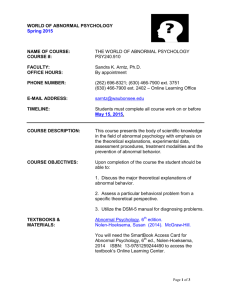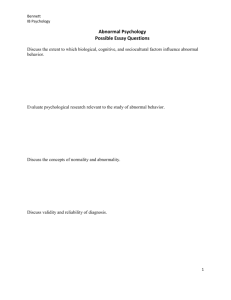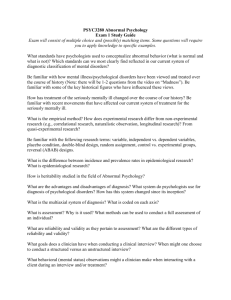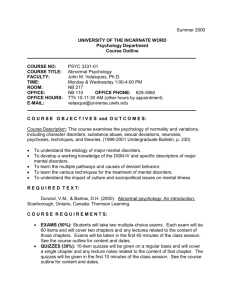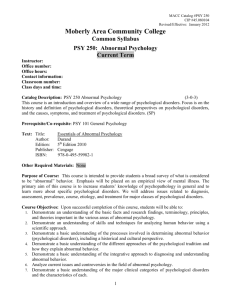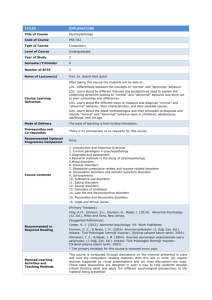Abnormal Psychology 412 section 001 - Fall 05
advertisement
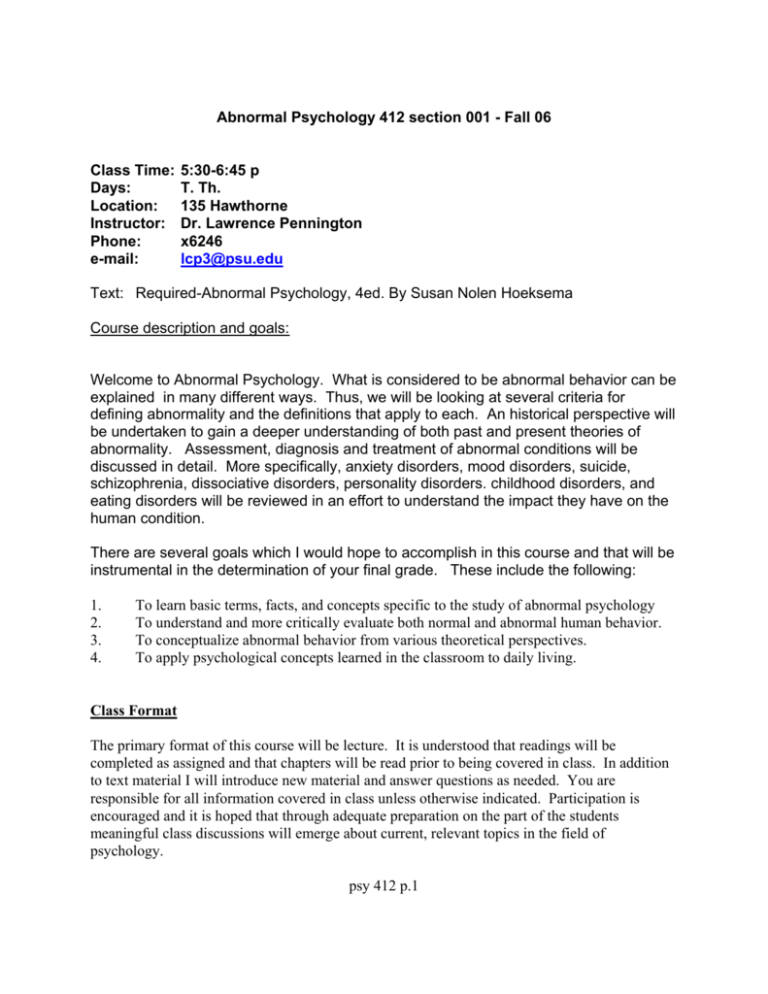
Abnormal Psychology 412 section 001 - Fall 06 Class Time: Days: Location: Instructor: Phone: e-mail: 5:30-6:45 p T. Th. 135 Hawthorne Dr. Lawrence Pennington x6246 lcp3@psu.edu Text: Required-Abnormal Psychology, 4ed. By Susan Nolen Hoeksema Course description and goals: Welcome to Abnormal Psychology. What is considered to be abnormal behavior can be explained in many different ways. Thus, we will be looking at several criteria for defining abnormality and the definitions that apply to each. An historical perspective will be undertaken to gain a deeper understanding of both past and present theories of abnormality. Assessment, diagnosis and treatment of abnormal conditions will be discussed in detail. More specifically, anxiety disorders, mood disorders, suicide, schizophrenia, dissociative disorders, personality disorders. childhood disorders, and eating disorders will be reviewed in an effort to understand the impact they have on the human condition. There are several goals which I would hope to accomplish in this course and that will be instrumental in the determination of your final grade. These include the following: 1. 2. 3. 4. To learn basic terms, facts, and concepts specific to the study of abnormal psychology To understand and more critically evaluate both normal and abnormal human behavior. To conceptualize abnormal behavior from various theoretical perspectives. To apply psychological concepts learned in the classroom to daily living. Class Format The primary format of this course will be lecture. It is understood that readings will be completed as assigned and that chapters will be read prior to being covered in class. In addition to text material I will introduce new material and answer questions as needed. You are responsible for all information covered in class unless otherwise indicated. Participation is encouraged and it is hoped that through adequate preparation on the part of the students meaningful class discussions will emerge about current, relevant topics in the field of psychology. psy 412 p.1 Evaluation and grading Grades will be based on quizzes, tests, a final exam, and one 10 page paper. 1) Five short quizzes will be given during the semester, some unannounced, some announced one class in advance. These will vary in format – multiple choice, fill-ins, short answer, etc. Each is worth 10 points. Answers to quiz questions will be reviewed immediately after the quizzes so that you may assess your performance. Graded quizzes will be brought to the next class. There will be no make-up for missed quizzes. 2) Four major tests will be given and the dates are indicated on the schedule. Each is worth 50 points and consists of 50 multiple choice questions. Review sheets for each test will be provided. Tests will be reviewed during the next class period. . If you miss a test as the result of a university related activity you must see the instructor within one week to make arrangements to take the examination. If you miss a test for any other reason you will makeup the examination as indicated on the class schedule. 3) One 10 page paper will be required worth 50 points. This paper will relate to the goals of the course. The paper should be written in the writing style which is most appropriate for your individual major. It is recommended that you visit the learning resource center located in the library. This visit will serve two purposes. First you will be able to determine the writing style which is most appropriate for your major and second you will be able to locate a valuable resource on campus which can provide tutoring if and when necessary. 4) The final exam is worth 50 points and will consist of 50 multiple choice questions. Your final grade will be based on the number of points you accumulate during the semester, I simply add points from all sources together. To summarize, points are available as follows: · · · · quizzes-5 quizzes for a total of 50 points. tests – 4 tests worth a total of 200 points. paper-1 paper worth 50 points. final exam-worth 50 points. The total number of possible points is 350. For each letter grade you must earn the following number of points: A= 315 or more B- = 269-279 A- = 304-314 C+ = 257-268 B+ = 292-303 C= 245-256 B= D= 210-244 280-291 psy 412 p. 2 F= < 210 Daily Schedule PSY412 (This schedule is approximate and subject to change) Date 9/5 9/7 9/12 9/14 9/19 9/21 9/26 9/28 10/3 10/5 10/10 10/12 10/17 10/19 10/24 10/26 10/31 11/2 11/7 11/9 11/14 11/16 11/21 11/28 11/30 12/5 12/7 Topic Reading Assignment Introduction Continuation Contemporary Theories Assessment and Diagnosis Continuation Test 1 (topic selection form due) Treatments for Abnormality Continuation Anxiety Disorders Anxiety Disorders Continuation Test 2 (1/2 final paper due) Mood Disorders Suicide Continuation Schizophrenia Test 3 Dissociative & Somatoform Disorders Continuation Personality Disorders Childhood Disorders Test 4 (Final paper due) Eating Disorders Mental Health and the Law Test Make-up day Review/Questions Review/Questions Chapter 1 Chapter 2 Chapter 4 Chapter 5 Chapter 6 Chapter 7 Chapter 9 Chapter 10 Chapter 11 Chapter 8 Chapter 12 Chapter 13 Chapter 15 Chapter 18 Final Date: 12/21/06 Time: 6-7:50p Location: 135 Hawthorn psy 412 p. 3 ACADEMIC INTEGRITY In 1984, Penn State adopted a formal policy on academic integrity and included it in the Policies and Rules for Students Manual. You should read the policy (Section 49-20 Academic Integrity) to become familiar with it. DEFINITION OF ACADEMIC INTEGRITY Academic integrity is the pursuit of scholarly activity free from fraud and deception is an educational objective of this institution. Academic dishonesty includes (but is not limited to) cheating, plagiarism, fabrication of information or citations, facilitating acts of academic dishonesty by others, unauthorized prior possession of examinations, submitting work of another person or work previously used without informing the instructor, and tampering with the academic work of another student. COURSE STATEMENT OF ACADEMIC INTEGRITY Academically dishonest students may be punished with a minor penalty, typically a zero on a quiz or test, or with a major penalty such as a grade of “F” in the course. Please note that a student may not be forced to withdraw from a course for an academic integrity violation by the teacher alone. Student or punished with major penalties may appeal the decision. Cases that are sufficiently serious to warrant disciplinary actions beyond academic sanctions may be preferred by the faculty member to the Office of Judicial Affairs for further review. Cheating includes (but is not limited to) copying others’ work bringing “cheat sheets” into an examination room, or using any resources during an exam other than those specified by the instructor. Anything that the instructor or exam proctor construes to be cheating a cheating. The instructor makes the decision as to whether the violation of academic integrity is minor or major in nature. Note to Students with Disabilities Penn State welcomes students with disabilities into its educational programs. If you have a disability-related need for modifications or reasonable accommodations in this course contact the Health and Wellness Center. For more information call (814)949-5540 or visit the Disability Services web site at www.aa.psu.edu/healthwellness. Instructors should be notified as early in the semester as possible regarding the need for modifications or reasonable accommodations. psy 412 p. 4 Final Paper Psy 412 In the past several years that I have been an instructor my students have often been required to complete a semester paper or group project. Group projects although often well done pose difficulties in grading due to the fact that there are often accusations that one group member did not work as hard as the others and thus does not deserve an equal grade. For reasons such as this and others I have chosen to have students complete a 10 double spaced paper based on a suggested list of topics I have chosen. Experience has taught me the following: 1. Even though I suggest topics often students areas of interest are too broad and they struggle attempting to condense their thoughts into 10 pages. 2. Students are often unfamiliar with appropriate writing styles. My preference is American Psychological Association (APA) however, I realize that students may be in majors which require other writing styles therefore a visit to the LRC Learning Resource Center is highly recommended. The center can help with tutoring as well as writing. Thus, APA is preferred but not required. If you do not use APA you must use the writing style recommended by your department. 3. Procrastination is a human frailty thus at the mid point of the semester 5 pages typed and double spaced are due. Please do not make the following mistakes: A. Name is not placed on paper. B. Abnormally large font size or spacing (10 or 12 is suggested). C. Pages are not numbered. D. Pages are not stapled or placed in a report cover. E. Choosing not to backup your word processing. F. Using outdated or irrelevant sources.(sources should be within the past 5-7 years). Use your time wisely waiting until the last minute to submit the paper often leads to unforeseen problems with other course requirements or technology. ---------------------------cut--------------------------------------------------cut-------------------------------------------------------------------------- Psy 412 Name_______________________________________ Chapter#_____________________________________ Title________________________________________ psy 412 p. 5
